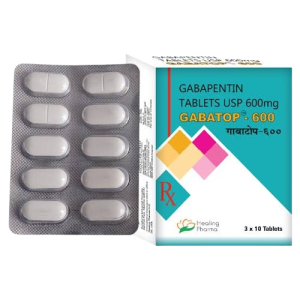Description
Gabapentin 800 mg Tablets – High-Dose Relief for Chronic Nerve Pain & Seizures
Gabapentin 800 mg is a high-strength oral medication used in the management of severe neuropathic pain, epileptic seizures, and fibromyalgia. It works by calming nerve activity in the brain and spinal cord, reducing pain signals and seizure frequency. This dosage is typically prescribed when lower strengths (300–600 mg) are insufficient.
Key Benefits:
- Strong relief for chronic nerve pain caused by diabetes, shingles, or spinal injury
- Used in the management of partial seizures (as adjunct therapy)
- May help reduce anxiety and improve sleep (off-label use)
- Suitable for patients who have built tolerance to lower doses
- Safe for long-term use when monitored by a healthcare provider
How to Use:
Take Gabapentin 800 mg by mouth, with or without food, as directed by your doctor—typically once or twice daily. Do not chew or crush the tablet. Follow the prescribed tapering schedule when increasing or discontinuing the dose.
Precautions:
- Inform your doctor about any kidney issues, respiratory conditions, or history of mental health disorders
- Can cause dizziness or drowsiness—avoid driving or using heavy machinery until you know how it affects you
- Should not be stopped abruptly due to risk of withdrawal symptoms or seizures
- May interact with opioids, alcohol, antacids, or other CNS depressants
Storage Instructions:
Store in a cool, dry place below 30°C. Keep away from moisture and out of reach of children. Do not use expired tablets.
Frequently Asked Questions (FAQs)
1. What is Gabapentin 800 mg used for?
Gabapentin 800 mg is prescribed to treat severe nerve pain (neuropathy), seizures, and sometimes anxiety-related disorders when lower doses are ineffective.
2. How long does it take for Gabapentin to work?
Some patients report pain relief within a few days. For seizures or anxiety, full effects may take 1–2 weeks. Dosage adjustments may be needed over time.
3. What are the side effects?
Common side effects include dizziness, drowsiness, fatigue, blurred vision, weight gain, or swelling. Rare but serious effects include mood changes or breathing issues (especially with opioids).
4. Can I take Gabapentin 800 mg long-term?
Yes, it is often used long-term for chronic pain or seizure disorders. Regular check-ups may be needed to monitor kidney function and side effects.
5. Can I split the Gabapentin 800 mg tablet?
Only if the tablet is scored. Otherwise, do not split or crush. Ask your pharmacist or doctor before doing so.
6. Is Gabapentin addictive?
Gabapentin is not classified as an addictive drug in most regions, but misuse can occur—especially at higher doses or when combined with opioids.




